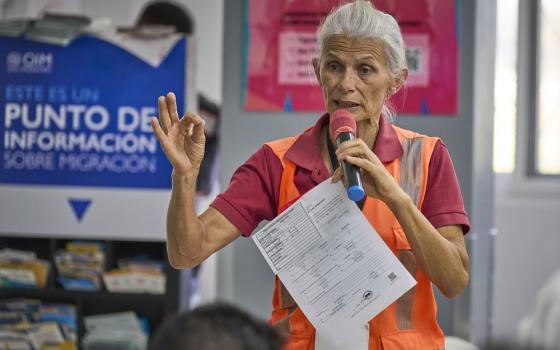Bishop Johan Bonny of Antwerp, Belgium, has called for ecclesiastical recognition of gay relationships, according to an interview published in De Morgen, a Belgian newspaper, on Dec. 27.
The official teaching that the Catholic church can recognize only male-female committed relationships has to change, Bonny said.
"There should be recognition of a diversity of forms," he said. "We have to look inside the church for a formal recognition of the kind of interpersonal relationship that is also present in many gay couples. Just as there are a variety of legal frameworks for partners in civil society, one must arrive at a diversity of forms in the church. … The intrinsic values are more important to me than the institutional question. The Christian ethic is based on lasting relationships where exclusivity, loyalty, and care are central to each other."
Bonny made headlines in September when he issued a letter to the Vatican in preparation for the Synod on the family in October. At that time, Bonny stressed that the church urgently needs to connect with contemporary society, showing more respect for homosexuality, divorced people and modern kinds of relationships.
“In his or her life,” he said, “everyone has to deal with relationships, friendship, family, and children's education. We should not deny that dealing with these issues within the church has brought injuries and traumas. Too many people were excluded for a long time."
Bonny said the open-minded spirit and pastoral focus of Pope Francis have given him the courage to speak out about issues that are important and pressing for today’s believers.
Will the church at some point give its blessing for gay and lesbian couples?
“Personally, I find that in the church more space must be given to acknowledge the actual quality of gay and lesbian couples; and such a form of shared-life should meet the same criteria as found in an ecclesiastical marriage,” Bonny said. “… And we have to acknowledge that such criteria can be found in a diversity of relationships and one needs to search for various models to give form to those relationships.”
Bonny stressed that the man-woman relationship has a special place in the Christian tradition.
“This relationship will continue to retain its own particular sacramental character and liturgical form,” Bonny said. “But this particularity does not have to be exclusive nor does it have to close the door on a diversity of relationships whose inner qualities the church can acknowledge.”
“Indeed, we need to seek a formal recognition of the kind of relationship that exists between many gay and lesbian couples,” he said. “Does that recognition have to be a sacramental marriage? Perhaps the church could much better reflect on a diversity of forms of relationships. One has the same kind of discussion about civil marriages. In Belgium the same model (for civil marriages) exists for man-woman relations as well as for same-sex relations.”
Later in his interview, Bonny stressed openness, the need for further reflection and the danger of getting wrapped up in a complex ideological discussion. He stressed as well that he is a strong advocate for recognizing a diversity of relationships that arise from serious reflection on practical pastoral realities.
Professor Rik Torfs, canon law expert and rector of the Catholic University of Leuven, warned that one should not minimize Bonny’s approach.
"Do not underestimate the significance of this,” he said. “Bonny advocates a change from principles long held as unshakable, something no bishop could have done under the dogmatic pontificates of Pope John Paul II and Pope Benedict XVI."
Bonny has a doctorate in theology from the Pontifical Gregorian University in Rome. In 1997, Cardinal Godfried Danneels and the Belgian bishops appointed him rector of the Belgian College in Rome; and in 2008 he was appointed the Bishop of Antwerp. Most observers see him becoming the next archbishop (and cardinal) of the Malines-Brussels archdiocese, when the incumbent, Archbishop André-Joseph Léonard, offers the pope his letter of retirement, at age 75, in May.
[John A. Dick is a historical theologian. He is retired from the Catholic University of Leuven and currently is a visiting professor of religion and values in American society at the University of Ghent.]


